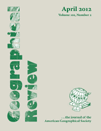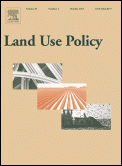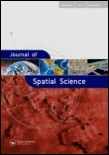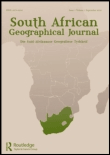
Geography and Sustainability
Scope & Guideline
Connecting Geography and Ecology for a Greener Tomorrow.
Introduction
Aims and Scopes
- Sustainable Urban Development:
Focuses on the integration of sustainability into urban planning and development, including the evaluation of urban climate models and urban green spaces. - Climate Change Impacts and Adaptation:
Investigates the effects of climate change across different ecosystems and human activities, emphasizing adaptive strategies for resilience in various geographical contexts. - Ecosystem Services and Biodiversity:
Examines the role of ecosystem services in achieving sustainable development goals, including assessments of biodiversity and its contributions to human well-being. - Land Use and Management:
Analyzes land use dynamics and their implications for sustainability, including agricultural practices, urbanization, and natural resource management. - Social-Ecological Systems:
Explores the interactions between human societies and ecological systems, focusing on community engagement, resilience, and governance for sustainable outcomes. - Geospatial Innovations:
Utilizes advanced geospatial technologies and modeling approaches to assess environmental changes and support decision-making in sustainability efforts.
Trending and Emerging
- Urban Resilience and Sustainability:
There is a growing emphasis on urban resilience strategies, particularly in the context of climate change and urbanization, showcasing innovative solutions for sustainable city living. - Integrated Ecosystem Services Frameworks:
Research is trending towards comprehensive frameworks that integrate ecosystem services into planning and policy-making, highlighting their importance for sustainable development. - Climate Change Mitigation Strategies:
Papers addressing practical mitigation strategies and their effectiveness in various contexts are gaining prominence, signaling a shift towards actionable research. - Community Engagement in Sustainability:
The importance of community participation in sustainability initiatives is increasingly recognized, with research focusing on local perceptions and collaborative governance. - Technological Innovations for Sustainability:
Emerging studies are exploring the role of technology, including remote sensing and big data analytics, in enhancing sustainability practices and monitoring environmental changes.
Declining or Waning
- Traditional Agricultural Practices:
Research focusing on conventional farming methods is less prevalent, as the journal shifts toward more innovative and sustainable agricultural practices. - Static Environmental Assessments:
There is a waning interest in static assessments of environmental conditions without dynamic modeling or adaptive management strategies. - Land Use Policy without Socioeconomic Context:
Previous studies that focused solely on land use policies without considering socioeconomic implications are becoming less frequent. - Historical Land Use Studies:
Research that emphasizes historical land use patterns without linking them to current sustainability challenges is declining, as the journal seeks more actionable insights. - Single-Dimensional Climate Studies:
Studies focusing solely on climate data without integrating ecological, social, or economic perspectives are being phased out in favor of more holistic approaches.
Similar Journals

Quaestiones Geographicae
Bridging Disciplines for a Deeper Understanding of GeographyQuaestiones Geographicae, an esteemed open-access journal published by SCIENDO, serves as a vital platform for scholarly communication in the field of Earth and Planetary Sciences. Since its inception in 1979, the journal has been dedicated to promoting rigorous research and discourse in geography, encompassing a breadth of topics that reflect the dynamic nature of the discipline. With an impressive Impact Factor belonging to the Q3 quartile category, the journal actively contributes to the global scientific community's understanding of geographical phenomena. Its commitment to open-access publishing since 2010 ensures that groundbreaking research is accessible to a wider audience, facilitating collaboration and innovation. As part of its enduring legacy, Quaestiones Geographicae engages researchers, professionals, and students alike, inviting them to explore, share, and expand the boundaries of geographical knowledge.

Present Environment and Sustainable Development
Empowering interdisciplinary dialogue for a greener future.Present Environment and Sustainable Development, published by ALEXANDRU IOAN CUZA UNIVERSITY PRESS, is a prominent open-access journal dedicated to advancing knowledge in the field of environmental science and sustainable development. Since its inception in 2014, the journal has provided a platform for researchers, professionals, and students to disseminate transformative ideas and innovative research aimed at addressing crucial environmental challenges. With its ISSN 1843-5971 and E-ISSN 2284-7820, it emphasizes the necessity of sustainable practices in contemporary society, facilitating interdisciplinary approaches that unite various fields, including ecology, policy, and socio-economic studies. Based in Iasi, Romania, this journal plays a vital role in fostering international collaboration and dialogue on sustainability, making it an essential resource for anyone committed to understanding and improving the environment for future generations.

GEOGRAPHICAL REVIEW
Illuminating the Intersections of Geography and DevelopmentGEOGRAPHICAL REVIEW, published by Taylor & Francis Inc, is a premier academic journal recognized for its influential contributions to the fields of geography and earth-surface processes. With an ISSN of 0016-7428 and an E-ISSN of 1931-0846, this journal has established itself as a vital resource for researchers, professionals, and students alike. The journal maintains a strong reputation with a Q1 ranking in both Earth-Surface Processes and Geography, Planning and Development, reflecting its scholarly impact and relevance in the academic community. Additionally, it holds a notable position in Scopus rankings, placing #181 out of 821 in Social Sciences and #45 out of 179 in Earth and Planetary Sciences. Although it is not open access, the GEOGRAPHICAL REVIEW remains essential for those seeking to expand their understanding of spatial analysis and environmental processes from its historical inception in 1969 to its ongoing publications through 2024. Explore rigorous research articles, critical reviews, and innovative studies that shape the discourse in geography and earth sciences today.

Journal of Geovisualization and Spatial Analysis
Navigating the Future of Earth Sciences with PrecisionJournal of Geovisualization and Spatial Analysis, published by SpringerNature, is an influential open-access journal specializing in the cutting-edge fields of geovisualization, spatial analysis, and their application in earth sciences and geography. Since its inception in 2017, this journal has established a prominent stance with a high impact factor and prestigious Q1 rankings across multiple categories, including Computers in Earth Sciences, Earth and Planetary Sciences (miscellaneous), and Geography, Planning and Development. The editorial board is committed to advancing innovative research and methodologies, providing a platform for scholars to disseminate their findings globally. With impressive Scopus rankings—placing it in the top percentiles among its peers—the journal serves as a vital resource for researchers, professionals, and students keen on understanding spatial data and its implications for geographic science. Its emphasis on rigorous peer review and rapid publication enhances accessibility to substantive research, thus fostering knowledge sharing within the scientific community. Based in Switzerland, the journal promotes a collaborative environment for interdisciplinary studies, making it an essential read for anyone involved in spatial analysis research.

Blue-Green Systems
Exploring Synergies Between Land and WaterBlue-Green Systems is an esteemed journal in the realm of environmental science, published by IWA PUBLISHING. With an ISSN of 2617-4782, this journal serves as a vital platform for disseminating cutting-edge research on the integration of blue (water-related) and green (land-related) systems, focusing on sustainable solutions to pressing environmental challenges. Since its inception in 2019, the journal has rapidly established itself as a leader in the field, ranked in the Q1 category across three domains: Environmental Science (miscellaneous), Management, Monitoring, Policy and Law, and Water Science and Technology, with impressive positions of #25/261 and #22/219 in their respective Scopus Ranks. This remarkable visibility and high impact factor reflect its commitment to advancing knowledge in sustainable management practices and policies. Researchers, professionals, and students alike can access the journal's rich content to enhance their understanding of the integration between ecological and hydrological systems, pivotal for driving innovative strategies in environmental management. Based in the United Kingdom, Blue-Green Systems contributes significantly to the global discourse on environmental sustainability and innovation, making it an essential resource for those aiming to influence future policies and practices.

Geographica Pannonica
Championing Open Access for Geographical ExcellenceGeographica Pannonica is a premier, open-access journal dedicated to the various dimensions of geography, atmospheric sciences, geology, and related fields. Published by the University of Novi Sad's Faculty of Natural Sciences and Mathematics, this Serbian journal has been a vital platform for scholarly discourse since its inception, with an open-access policy established in 2010 to enhance the dissemination of research findings. Covering a spectrum of topics from Earth-surface processes to tourism management, the journal has achieved notable rankings, reflecting its commitment to impactful research—ranking in the Q3 quartile across multiple categories in 2023. Researchers, professionals, and students are encouraged to engage with the latest articles that contribute to advancing our understanding of geographical phenomena and sustainability challenges, making Geographica Pannonica an essential resource for the global academic community.

Visnyk of V N Karazin Kharkiv National University-Series Geology Geography Ecology
Fostering innovative research for a healthier planet.Visnyk of V N Karazin Kharkiv National University-Series Geology Geography Ecology is a prominent academic journal dedicated to the fields of geology, geography, and ecology. Published by the esteemed V N Karazin Kharkiv National University, this journal aims to disseminate high-quality research findings and theoretical perspectives that advance understanding in these critical scientific areas. With the ISSN 2410-7360 and E-ISSN 2411-3913, it serves as a vital platform for scholars, researchers, and students striving to contribute to environmental science and sustainable development. The journal promotes open access, ensuring that research is readily accessible to a broad audience, thus facilitating the exchange of knowledge across borders. Its commitment to scholarly excellence makes it an essential resource for anyone engaged in the study of Earth's systems and their interconnections. For additional information and to submit your research, please visit the journal's website.

LAND USE POLICY
Shaping the Future of Sustainable Land ManagementLAND USE POLICY, published by ELSEVIER SCI LTD, is a premier academic journal dedicated to advancing the study of land use issues and policies, with a particular focus on sustainable management and conservation practices. Since its inception in 1984, this journal has established itself as an influential platform in the fields of Forestry, Geography, Planning and Development, and Environmental Science, consistently achieving a Q1 category ranking across various disciplines. With an impressive impact factor and recognition as a top-tier source (e.g., ranking #18/821 in Geography and Planning), it serves as a critical resource for researchers, practitioners, and policy-makers looking to address complex land use challenges. Although it does not offer open access, the journal's articles are widely accessible through institutional subscriptions, enhancing its reach. Researchers and students can find valuable insights into innovative policies and methodologies that promote sustainable land management, making LAND USE POLICY essential reading for anyone engaged in environmental studies and policy development.

Journal of Spatial Science
Pioneering Research for a Sustainable Spatial FutureThe Journal of Spatial Science, published by Taylor & Francis Ltd, serves as a prominent platform for the dissemination of research in the interdisciplinary fields of geography, atmospheric science, and energy. With an ISSN of 1449-8596 and an E-ISSN of 1836-5655, this journal has established itself as a vital resource since its inception in 2004, boasting an impressive convergence period extending to 2024. Recognized in the Q3 quartile for Atmospheric Science and Energy (miscellaneous), and achieving a Q2 classification in Geography, Planning and Development in 2023, the journal not only reflects the evolving complexities of spatial science but also underscores its increasing relevance in addressing contemporary global challenges. The journal holds a commendable position in Scopus rankings, with notable placements in various categories, further highlighting its academic significance. Researchers, professionals, and students are encouraged to engage with the rich content offered, as the Journal of Spatial Science remains committed to advancing knowledge and fostering discussions pertinent to spatial analysis and its applications.

South African Geographical Journal
Connecting research and practice in geography and planning.The South African Geographical Journal, published by Routledge Journals, Taylor & Francis Ltd, is a leading scholarly platform dedicated to advancing research in the fields of geography, planning, and development. With an impressive history spanning from 1931 to 2024, this journal not only retains its relevance in the academic community but also proudly holds a Q2 rank in both Earth and Planetary Sciences and Geography, Planning and Development, marking it as a significant contributor to the scholarly discourse. The journal is ranked in the top 32% of its category within Scopus, affirming its stature among researchers and professionals. Although it currently does not offer Open Access, the journal provides a critical forum for the exchange of ideas, methodologies, and findings, encouraging dialogue that informs policy and practice in the geographical sciences. Readers can expect a rich variety of articles that encompass both theoretical and practical aspects of geography, making it essential for academics and practitioners alike.